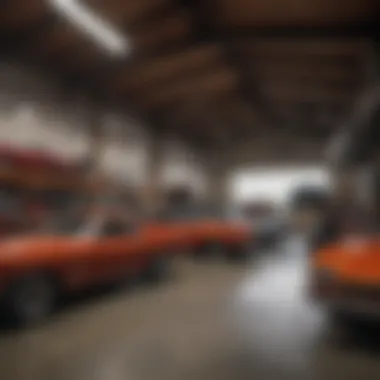Understanding American Collectors Insurance and Towing


Overview of the Financial Topic
Definition and Importance
American collectors insurance is a specialized form of coverage designed to protect vintage, classic, and collectible vehicles. Unlike standard auto insurance, this type is tailored for vehicles that hold significant value due to their age, rarity, or special features. The importance lies in ensuring owners are compensated adequately in case of damage or theft, preserving values that can sometimes reach astronomical sums.
Understanding this niche insurance is essential for collectors. It provides peace of mind, allowing individuals to enjoy their vehicles without constant worry about what might happen. Moreover, this insurance is vital in a marketplace where values fluctuate wildly based on global trends and collector demand.
Key Terms and Concepts
When digging into collectors insurance, a grasp of key terms is paramount:
- Agreed Value: This is the predetermined value of the vehicle known to both the insurer and the owner. Unlike standard replacement cost coverage, this ensures no negotiations happen during claims.
- Market Value: The current market price a vehicle may fetch. It's essential to differentiate this from agreed value.
- Usage Limits: Often, policies may restrict usage to shows or limited distances.
Understanding these terms will set a robust foundation when navigating the insurance landscape for collectible vehicles.
Exhaustive Analysis of Insurance Products
Types of Financial Products Available
In the realm of collectors insurance, several types of coverage can be identified:
- Classic Car Insurance: Specifically for cars institutionalized within age limits, often geared toward antique vehicles.
- Specialty Vehicle Insurance: Broader than classic car, this may include motorcycles, airplanes, or military vehicles. Depending on tillage or utility, definitions differ.
- Collector Vehicle Insurance: Targets enthusiasts who restore these vehicles for accumulation, not just consumption.
Pros and Cons of Each Option
Each product comes with its strengths and weaknesses.
- Classic Car Insurance
- Specialty Vehicle Insurance
- Collector Vehicle Insurance
- Pros: Tailored for older vehicles; often lower premiums.
- Cons: Contains specific usage limitations; may not cover modifications made by the owner.
- Pros: Liquidity for a wider array of vehicles; accustomed rates depending on the category.
- Cons: Potentially higher costs; uncertain definitions may lead to confusion.
- Pros: Aimed at true car lovers, often rich in benefits.
- Cons: Specifications might be strict, often excluding daily use.
Market Trends and Insights
The collectors insurance market currently appears to be flourishing. There has been a noticeable increase in interest among millennials, driving demand up for classic and muscle cars. Riding the revival, companies are tailoring packages to cater to shifting sentiments. This is accompanied by growing platforms offering comparisons for insurance proposals, making it easier for collectors.
Comparison and Evaluation
Case Studies or Examples
First, look at a case study of James, a classic car collector based in Ohio. He chose classic car insurance with a reputable provider. After an accident, James received the pledged agreed value without an issue. Such experiences often become yardsticks for assessing the service reliability of an insurer.
User Experiences and Feedback
Reviews from online platforms settled on selections that resonate effectively with customers. Generally, collectors demand legitimate concern, accurate assessments, and promising payout structures.
Expert Recommendations
Tips from Financial Advisors
To maximize value in the area of collectors insurance:
- Regularly assess your vehicle's value and update insurance correspondingly.
- Collector vehicles require museum quality; document everything and keep records.
- Consider well-reputed companies with long-term industry presence.
Suggested Frequently Asked Questions (Help Sections)
What if modify my vehicle?
Understanding how modifications affect agreed values is crucial. Always inform your insurer.
Is there an age limitation on classic cars?
Most insurers regard vehicles over 20 years to be classics; each firm may hold its stance.
Steps Toward Implementation
Practical Steps for Users to Take


Engage efficiently by following these guidelines:
- Conduct a proper valuation of your vehicle before purchase.
- Review available collectors insurance options thoroughly.
- Initiate conversations with several insurers to gauge premium offers and response rates.
Tools and Resources for Assistance
- U.S. Collector Car Facebook Group: A community encouraging discussions related to collectors where insurances are frequently discussed.
- Specialty insurance tracks on Reddit to gather real-life feedback on various insurance experiences.
Important Considerations and Warnings
Always read the policy fine print. Restrictions on claims can appear strewn throughout, so clarity is necessary though often overlooked.
The knowledge, context, and understanding individuals attain about collectors insurance prepares them to face an unpredictable future with less fear.
Understanding American Collectors Insurance
American collectors insurance focuses on the needs of vehicle enthusiasts who own classic, antique, and specialty vehicles. Recognizing that these vehicles require understanding similar to heirlooms or investments, it provides essential coverage tailored to specific needs. Vehicle collectors seek more than commonly available car insurance. They require coverage that enhances the value of their prized possessions while offering the protection necessary against potential losses. This importnce arises from the unique nature of classic car ownership where value can derive not just from the practical functionalities but from emotional significance as well.
Definition and Importance of Collectors Insurance
Collectors insurance is designed specifically for classic, vintage, and, in some cases, collectible vehicles, providing specialized coverage that traditional auto insurance may not offer. These policies often appeal to self-aware owners who value their vehicle’s cultural and economic worth. The importance lies in the fact that ordinary insurance may not sufficiently reimburse owners for the full value of their vehicles in case of damage or loss. Collectors need assurance that they have coverage proportional to their investment. Moreover, among their key advantages, collectors insurance proposes high limits for vehicle values and can reflect the current trends in the market.
Types of Vehicles Covered
Collection insurance tends to include a spectrum of vehicles, adaptable to diverse buyer needs. Three significant categories reflect the kinds of vehicles often under this umbrella:
- Classic Cars
Classic cars generally represent vehicles that have maintained appeal over decades. This specific sector of automotive excellence contributes toward the preservation of cultural histories. An included characteristic is that these cars predominantly show impeccable craftsmanship and often fetch premium prices at auctions. They are popular insurance choices not only for their investment potential but for personal passion as well. Covering them under a collector's policy can derive the preferential valuations that classic vehicles hold in collector communities. - Antique Vehicles
Antique vehicles, typically defined as cars over 45 years old, capture the nostalgia surrounding earlier automotive designs. Their specific aspect relates to their rarity and historical significance, presenting collectors an opportunity to own a tactile piece of the past. They are beneficial due to mechanisms that allow easy financing or reassessment for unexpected evaluations. However, due to their age, antique parts could demand knowledgeable handling, leading to a unique risk factor that insurance policies must adequately address. - Specialty Cars
Specialty cars denote unconventional vehicles too unique for standard classifications. This can encompass everything from unique modifications to low production numbers. Their key characteristic is the personal expression tied to vehicle customizing or styling presenting excellent coverage options that safeguard unique investments. For many owners, securing specialty cars under consecrated collectors insurance means creative freedom in vehicle BES while mitigatng risks should they manifest during permanent modifications.
Key Features of Collectors Insurance Policies
Each collector’s insurance policy includes features tailored to the complexities surrounding classic, antique, and specialty vehicles. Here are the quintessential elements often highlighted in such policies:
- Agreed Value Coverage
Agreed value coverage is a fundamental aspect where the policyholder and the insurer agree upon the vehicle's value at the initiation of the policy. This contracted value becomes crucial if a loss occurs because it guarantees total loss payments set against the specified valuation. For collectors, this feature avoids diminutive paybacks became of other market fluctuations or depreciations. Hindrances mainly arise from situations where market practices espacio uncertainty due to decreasing values following economic shifts. - Flexible Mileage Options
With flexible mileage options, collectors can customize policies based on their unique usage patterns. Traditional insurers tend to limit miles driven, yet classic car owners typically use these vehicles sporadically—often for shows, experiences, or special events. Mid-range mileage variants cater evenly to dedicated users while offering alternatives that respond to owners' shifting needs over cyclical car usage periods whereitness proves fvit placated as driving looms most extreme. - Specialized Coverage for Events
Specialized event coverage is vital in scenarios where collectors take wishes for pursuits like car shows or exhibitions or for driving over acclaimed scenic routes. It safeguards against damages while allowing quintessential ownership experiences such as promotional or distinctive configuration requirements. Such limits or extensions engnate enforceations that defiantly commit collection spots assuring that all ideal currencies simultaneously inflate underlying asset costs creating reparable distinctions toward owning events essentially weeaged in deterministic craft exposing sector ownership.
The Role of Towing in Collectors Insurance
Towing services play a critical role in the domain of collectors insurance. Understanding how these services integrate with collectors insurance provides valuable insights to owners of classic or collectible vehicles. As these vehicles often hold both sentimental and financial value, ensuring they are properly protected during transportation or roadside incidents is essential.
Furthermore, possessing detailed knowledge about towing aspects can vastly enhance the overall insurance experience. Owners should carefully evaluate towing offerings when selecting their insurance policies, as these elements contribute to ensuring safety, convenience, and peace of mind.
Towing Services Defined
Towing services refer to the assistance provided to vehicles that become immobilized due to technical failures, accidents, or other unforeseen circumstances. Such services can include hooking up the vehicle, transporting it to a secure location, and providing roadside support. For collectors, this means having a mechanism to ensure that their prized possessions can be moved safely and efficiently whenever necessary. It’s important to recognize that not all towing services are the same, particularly when it comes to classic and specialty vehicles, making informed choices paramount.
Why Towing Services Matter for Collectors
Towing services are not just about moving vehicles from point A to point B. For collectors, insurance coverage often hinges on how the vehicle is handled in precarious situations. This could mean:
- Protecting the Vehicle's Condition: Specialized towing ensures that our vehicles are treated with the care they deserve, preventing damage during transport.
- Convenience On-Site: Knowing help is just a quick call away allows collectors to enjoy their passion with less anxiety about breakdowns or accidents.
- Enhanced Policy Coverage: Some policies may offer benefits based on the presence of robust towing support, making it a valuable facet of collectors insurance.
Taking these points into account underscores the necessity of reliable towing services in the lives of collectors.
Coverage for Towing with Collectors Insurance
Emergency Towing Assistance
Emergency Towing Assistance is a significant aspect of collectors insurance. This feature ensures instant help when a collector encounters a roadside problem. The main attraction of this coverage is its immediacy; collectors know they can rely on it at critical moments. An advantageous quality of this emergency setup is its 24/7 availability. This helps to cover any time-based situations , preserving depth of coverage. However, collectors need to know the scope of what this assistance includes to ensure it aligns with their needs.
Transportation to Repair Shops
Another important service involves Transportation to Repair Shops. This provision entails transporting vehicles that may require repairs after an accident or breakdown directly to authorized service centers. It emphasizes convenience while minimizing risk. The notable characteristic is how seamlessly it addresses the need to restore vehicle functionality. Collectors should appreciate this offering as it becomes the bridge to expert repair solutions. One unique feature of this type of coverage is its often-inclusive mechanics who specialize in collectible vehicles. Despite its benefits, careful assessment of include edges in benefits can prevent confusion following an incident.
Protection During Scheduled Events
Protection During Scheduled Events focuses strategically on covering vehicles during special gatherings or events. Classic car shows or theme-related exhibits are times when vehicles are exposed to currents of favoritism and potential mishaps. This is crucial for collectors planning to display or use their vehicles in such venues. The quality enjoyment during events adds considerable value to this type of insurance. One unique aspect is the ability to tailor coverage according to specific events or needs. However, enthusiasts must review the terms to ensure they understand any limitations in coverage, primarily associated with duration or geographical limitations.
Insurance Options for Towing Services
Insurance for towing services is critical in the realm of collectors insurance. It serves as a safeguard for owners of classic, antique, and specialty vehicles when unexpected incidents arise on the road. Having the right towing insurance can prevent significant expenses that could accumulate from towing services. Additionally, it addresses various scenarios a collector's vehicle may encounter, thus safeguarding the owner's investment. Thoughtful consideration of towing insurance options implies awareness of vehicle use and accident potential, which could greatly affect long-term ownership objectives.
Towing Insurance Types
On-Road Programs


On-road programs focus on offering a membership or a subscription-style service for towing and roadside assistance. This option is attractive for vehicle owners who frequently use their cars or transport them during events. A distinctive feature of on-road programs is their wide range of services, not just towing, such as battery jump-starts, tire changes, or fuel delivery.
Key Characteristics: Availability on demand, typically an annual fee, and expanded services.
Advantages of these programs include peace of mind knowing that help is just a call away, enhancing safety on the road. However, some might find that the associated costs can accumulate over time, especially if they rarely utilize the service.
Off-Road Assistance
Off-road assistance specializes in towing vehicles that operate in non-paved environments. This option supports vehicle owners who partake in activities like off-roading, racing, or woodland excursions. A vital characteristic of off-road assistance is its ability to cater to dramatic terrain or mishaps that everyday drivers might not encounter.
Key Characteristics: Tailored towing for rugged vehicles, company drivers trained in off-road recovery tactics.
The benefit of such coverage is markedly evident for those with a collector vehicle employed under tough conditions. Disadvantages might include that even if essential, this coverage is probably unnecessary for average collectors who keep vehicles for shows or road usage.
Commercial Towing Coverage
Commercial towing coverage pertains to businesses involving vehicle transportation and repair. This option might be relevant when classic vehicle owners offer promotional or commercial activities requiring the movement of featured cars. Key points of interest include the necessity to protect both driving doses and collector's insurance interests when using work equipment.
Key Characteristics: Structured for businesses, typically more robust coverage levels.
This coverage type can legitimately be seen as a protective layer against theft during transport or misuse of vehicles. On the downside, costs can increase significantly depending on the volume of vehicles transported or financed coverage by commercial dealers.
Evaluating Towing Insurance Options
When gauging the range of towing insurance options, it is essential to assess all available alternatives against future vehicle usage and exposure levels. Seeking professionals, browsing package details, and making inquiries is advisable to ascertain coverages prioritize diverse vehicle needs or handling situations. Key considerations make evaluation impactful and informative for owners aiming to decide on the best fit for their transport scenarios or daily routines.
Considerations When Choosing Towing Insurance
Frequency of Use
Considering how often the vehicle is operated should commit time and attention. Vehicles used regularly will likely need a robust towing plan, relying more on immediate assistance and availability. Owners of classic vehicles not frequently on the road may find they need less coverage.
Key Characteristic: Analysis determines balance between excess spending and real utility.
Unique to frequent users include peace of mind and no worries when hitting the road, but potential high costs can appear over time for collectors not often in motion.
Types of Terrain
Terrain conditions essentially define either daily operational parameters or specialist utilization cases. Assessing terrain types leads to more selective coverage plans based on factors surrounding shipping risks and secure transport during substance changes across varied pathways.
Key Characteristic: Diverse needs are essential.
Customized, advantageous interpretations from terrain evaluations equip vehicle owners with foresight into vehicle wear or incident probabilities, yet daily users may discover off-road planning doesn't normally benefit ordinary traveling carefully.
Specific Vehicle Requirements
Consideration of specific vehicle attributes includes size, weight, and type of restoration. Distinct cars might influence both the comprehension of scenarios portrayed through event experiences and return on investment regarding protective features.
Key Characteristic: Adequately addressing vehicles incentivizes coverage levels for financial stake beside vehicle durability
Details about specific vehicle contexts supply tailored knowledge adjusting guarantees inherent within certain operations while maintaining essential support outputs seen with higher-than-normal limits represent legitimate security assured tools when pursuing collectors’ insurance existing relative guidelines.
Payment Structures for Towing Services
Understanding the payment structures for towing services is essential for collectors of classic vehicles. These structures determine how costs are calculated, which influences how owners budget for potential towing needs. Knowing these nuances helps vehicle owners to approach their towing services more effectively.
Costs Associated with Towing
Towing costs can vary significantly due to many factors. Two major components are common in the industry: flat rates and distance-based charges.
Flat Rates
Flat rates simplify the pricing model for consumers. This structure offers a set amount for towing services, regardless of the specific distance or time involved. One key characteristic of flat rates is that they usually cover a predefined radius, which makes budgeting predictable. Flat rates are often preferred by vehicle owners since they eliminate surprises in the final bill.
However, the unique feature of flat rates is that they often do not account for extended distances. If a collector’s vehicle is towed beyond the agreed radius, substantial extra charges may apply. This can be a disadvantage if unexpected circumstances arise, leading to unforeseen expenses.
Distance-Based Charges
Distance-based charges reflect the actual miles towed, directly impacting the final expense. This type of charge can be flexible, allowing consumers to only pay for the mileage relevant to their situation. One key characteristic is that it provides potentially lower costs for shorter trips.
That said, the unique feature of this payment structure might lead to increased expenses if the vehicle needs towing over longer distances. Vehicle owners may find themselves paying significantly more if they need to transport their collectible cars across state lines.


Payment Methods for Towing Services
A variety of payment methods exist for towing services, each with its own advantages and disadvantages.
Insurance Payments
Making towing payments through an insurance company is a common practice among collectors. This approach ensures that costs are partially or fully coverage by the insurance policy the collector holds.
With insurance payments, one benefit is reduced out-of-pocket costs when misfortunes happen. This method relieves vehicle owners of immediate payment stress, allowing them to focus on resolving issues related to their vehicles. However, the reliance on insurance to cover towing expenses might delay actual service depending on how promptly the insurer carries out claims processes.
Out-of-Pocket Expenses
On the contrary, opting for out-of-pocket expenses can offer instant resolution during towing events. By paying cash, credit, or checks directly to a towing service, vehicle owners ensure that their cars are taken care of without involving any third-party delays.
The key characteristic of this payment method is flexibility. especially when collectors have access to emergency funds. Nevertheless, a drawback could be the burden of unexpected costs, leading collectors to pay more without the safety net provided by insurance claims.
Reimbursement Processes
Once a collector pays for towing, understanding the reimbursement processes is vital. Insurance companies typically have protocols that dictate whether a service is eligible for reimbursement. Collection owners must document their expenses and present viable proof, such as receipts and other relevant paperwork.
The efficacy of this process varies. It usually demands time and thoroughness, with timelines running between several days to weeks. Collectors should engage with their insurance companies ahead of time to understand specific steps to ensure a smooth and expedited reimbursement.
Best Practices for Vehicle Owners
When it comes to collectors insurance and towing, having effective best prctices in place is fundamental for any vehicle owner. This section enhances the reader’s comprehension of essential policies and the integration of these aspects in their vehicle ownership journey. Addressing best practices ensures that vehicle owners do not only safeguard their investments but also avail themselves of optimal rescources and support in times of need.
Choosing the Right Insurance Policy
Selecting the correct insurance policy is crucial for anyone who owns classic or collectible vehicles. This choice can affect everything from coverage limits to premium costs. You should start by considering a policy specifically designed for collectors, such as American Collectors Insurance. This type of policy typically offers specialized coverage that addresses unique risks associated with classic and antique vehicles.
Also, when evaluating options, consider the professional judgment on your vehicle's value. Using appraisals or endorsements from collectible vehicle specialists can provide clarity when determining coverage amounts. This ensures you aren’t under-insured, especially during unforeseen incidents. Factors to examine include:
- Coverage types: Understand if you can opt for market value versus agreed value policies.
- Deductible choices: Weigh the costs of higher deductibles versus lower monthly premiums.
- Liability limits: It is wise to have coverage that addresses your financial situation if accidents occur.
Understanding Coverage Limits
Understanding the limits of your insurance coverage helps recognize how much protection your policy really provides.
Different insurance policies may have a variance in specific elements such as:
- Years of coverage: Some policies may cover cars less than 20 years old while others may extend to older models.
- Mileage limits: American Collectors Insurance typically provides different mileage options suited to your needs. Depending on usage, some owners may wish to have limits far less than the standard 4,000 annually.
- Event coverage limitations: Policies may also differ in their details regarding event participation, be that driving to car shows or participating in rallies.
Being proactive about understanding these aspects allows vehicle owners to prevent gaps that might affect financial recovery during unfortunate accidents.
Staying Informed About Policy Changes
It is importnt for vehicle owners to remain informed of any changes to their insurance policy. Insurers occasionally adjust terms and conditions, premiums, or coverage limits based on various factors such as inflation, changes in regulations, or updates to underwriting criteria.
A few strategies that can help keep you updated include:
- Annual reviews: Review your coverage at least once a year to ensure it reflects your current needs. Vehicle values can fluctuate, thus requiring adjustments to policies.
- Communication with your insurance agent: Engage in conversations with your insurance representative periodically so they can highlight any changes relevant to your policy.
- Subscribing to newsletters: Join the informative newsletters of your insurer to learn about their latest offerings, promotions, or updates in rules.
Staying engaged in this process will enable owners to adapt to changing circumstances effectively ensuring protection continues through the lifecycle of the high-value and classic vehicles they cherish.
Future Trends in Collectors Insurance and Towing
The landscape of American collectors insurance and towing services is evolving. Understanding future trends is crucial for collectors of classic and specialty vehicles. This section delves into important themes affecting how insurance is structured and towing services are provided. Technology is driving changes, new services are emerging, and consumer preferences are shifting. Following these trends can provide valuable insights into navigating insurance and towing arrangements effectively.
Impact of Technology on Insurance
Technology plays a pivotal role in shaping collectors insurance. Advancements in data analytics and artificial intelligence allow insurers to create more precise risk assessments. This leads to tailored policies that offer better coverage at reasonable prices. Moreover, telematics can track vehicle conditions and usage patterns. Such insights enable the collection of data which, in turn, refines underwriting processes.
Also, online platforms provide collectors with access to compare various insurance products easily. With tools like mobile apps, clients now manage policies seamlessly and report claims with just a few taps. All of these technological advancements foster accessibility and efficiency in the insurance process.
Emerging Towing Services
New towing services specifically designed for classic vehicles are gaining traction. With a focus on safety and care, these specialized towing services use equipment that minimize the risk of damage when transporting valuable autos. They also offer additional features, like climate-controlled transport and covered trailers. These services cater to collectors seeking peace of mind, knowing their vehicles are handled specifically for their unique needs.
In addition, on-demand towing services are now available through apps. Owners can quickly summon a towing vehicle equipped to handle precious loads when needed. This shift towards convenience highlights the evolving nature of service in the towing industry.
Predicting Changes in Consumer Preferences
Consumer preferences are shifting as new generations of collectors emerge. Younger collectors are more inclined to seek online solutions for their insurance needs. They prefer instant results and transparency in pricing over traditional, more opaque processes. Consumers today are looking for policies that adapt to their lifestyle, especially in the context of mileage options and usage frequency.
Furthermore, the antique car community is embracing environmentally friendly practices. Collectors are increasingly interested in policies that provide coverage for electric classic cars and hybrids. As the automotive landscape changes, insurance products must evolve to reflect these new realities and preferences.
Collectors are more educated and informed than ever. They seek products and services that match their values and needs.
Staying abreast of these trends is critical for collectors aiming to maximize their investments and ensure comprehensive support for their collecting experience.







